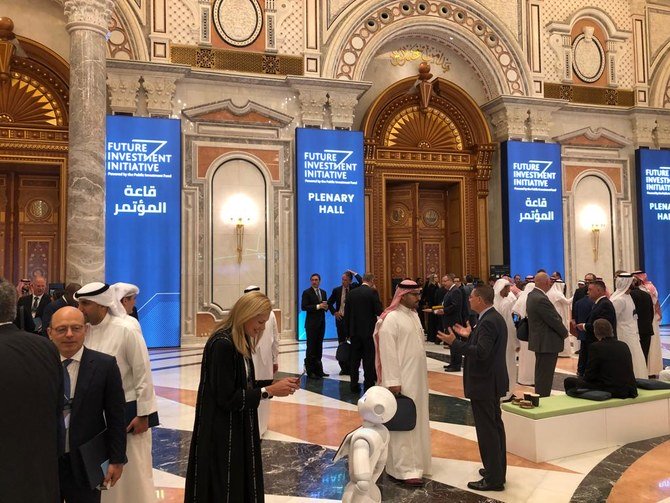
- ARAB NEWS
- 12 Jul 2025

DUBAI: Yasir Al-Rumayyan, the Governor of Saudi Arabia’s Public Investment Fund, said that Saudi Aramco would soon have more shareholders from institutions during the opening plenary of the three-day Future Investment Initiative being held at the swanky Ritz Carlton hotel in Riyadh.
The initial public offering of Saudi Aramco, believed to be at the Tadawul, could be forthcoming with an official announcement expected any time soon. Russian and Chinese investors are keen to join international element for the IPO of the world’s largest oil company.
Al-Rumayyan also said the reason for the separation of Saudi Aramco from the Kingdom’s energy ministry ‘was to prevent conflict of interest.’
The PIF chief in his opening address earlier said the Future Investment Initiative has evolved from just an annual gathering to become a hub for building relationships.
Watch the opening day sessions of Future Investment Initiative 2019:
https://youtu.be/NTEjFS8RuyM
“Until now the Future Investment Initiative has been an annual conference, today it is an institution... it will be a global hub to build relationships," he said told participants.
Al-Rumayyan also said the Riyadh gathering’s inclusivity has expanded: “In 2017, the participants were mainly coming from the Americas, Europe and the Middle East. Today they are coming from Japan, China, India, Russia … all united in a spirit of collaboration.”
The opening plenary “The next decade: How will a new era of economic ambition shape the global economy?” tackled ways to foster growth – ideas, innovations, technologies and policies – amidst heightened global uncertainty.
“I think we are all dealing with uncertainty more than before in terms of technology… the Internet, social media are making it difficult to manage companies and countries,” Blackstone Group founder and CEO Stephen Schwarzman told the assembled audience. “The kind of anger that social media can mobilize is something that, all of us, no matter what, have to deal with.”
Goldman Sachs Group Chairman John Waldron meanwhile said: “Our relationship with our clients has changed a lot over the past years – the focus on capital spend is shifting from more traditional areas to more innovation, computing, AI.”
Noel Quinn, Group Chief Executive at HSBC Holdings, meanwhile told the panel that “Parts of the industry are changing dramatically through the use of technology.”
“The global frame works and global architecture that we used to operate within are changing rapidly around us - technology is changing the market, businesses have to survive by adapting,” Quinn added.
Al-Rumayyan meanwhile highlighted the adaptability of the Kingdom’s sovereign wealth fund.
“You should always have adaptability. At PIF, we are doing investments with impact in residential, in healthcare, in renewable energy and many other sectors – we can bring certainty to these because of the impact of big investments,” he said.
From a Middle Eastern and Asian viewpoint, Mukesh Ambani, the Chairman and Managing Director of Reliance Industries, commented: “The world is transiting with the introduction of new technologies – they are transforming global economy and while they bring uncertainty, they also bring opportunity.”
Khaldoon Al-Mubarak, CEO of UAE-based Mubadala Investment Group, said “We have been seeing heightened uncertainty for a while now – for the last 15 years we have seen an escalation of this, I expect the future to be the same, but that doesn’t mean it’s good or bad.”
“As an investment institution, we have tried to navigate through this uncertainty ... We have the benefit of being a sovereign fund to take a long-term view.”
The Mubadala chief likewise noted ‘the power and disruption of technology are going to make it impossible on the prediction side ... you have to be very well-versed in the language of artificial intelligence.”
Meanwhile, Russian Direct Investment Fund CEO Kirill Dmitriev said: “sovereign funds are going to be particularly useful going forward because they can plan for longer horizon, they have lots of capital to deploy.”
The third annual conference is being attended by heads of states, government leaders and decision-makers from the business and finance communities.
Among the dignitaries expected during the event include King Abdullah of Jordan, Prime Minister Narendra Modi of India, President Jair Bolsonaro of Brazil, President Muhammadu Buhari of Nigeria while business leaders including Mukesh Ambani, chairman and managing director of Indian conglomerate Reliance Industries; Khaldoun Al-Mubarak, CEO of Mubadala Investment Group; and will Alain G. Bejjani, CEO of Majid Al-Futtaim will be joining plenaries during the opening sessions.
Arab News